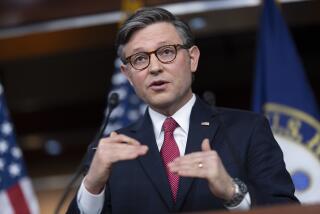Legislators fail again to vote on Iraq election law
- Share via
BAGHDAD — Two U.S. soldiers died in a roadside bombing in eastern Baghdad on Monday, and Iraq’s government once more failed to hold a vote on a crucial law that would allow provincial elections this year.
The bomb struck the U.S. troops’ vehicle at 9:30 a.m., and left another soldier wounded, the military said in a statement. The deaths raised U.S. military fatalities in the Iraq war since March 2003 to 4,131, according to the independent website icasualties.org.
Iraq’s parliament did not meet for a second straight day as a stalemate continued over legislation that would permit provincial elections this year, which U.S. officials think could help cement recent security gains in Iraq.
Lawmakers were split about the chances of resolving the impasse, which began when Kurdish politicians bolted from parliament July 22 as lawmakers first prepared to vote on the election law. In that session, Arab parliament members insisted on a secret ballot regarding the status of the disputed, oil-rich city of Kirkuk, which is home to Arabs, Turkmens and Kurds.
Kirkuk’s Turkmens and Arabs had pushed for a quota system for the province’s governing council, which the Kurds dominate. Kurds want to annex the city and the surrounding area to their semiautonomous region in northern Iraq as they seek to correct the legacy of the late dictator Saddam Hussein’s policy of displacing Kurds from the disputed area.
Parliament’s summer recess was supposed to begin this week, and the sides set an emergency legislative session for Sunday to resolve differences over the election law. However, they could not reach accord beforehand, and there wasn’t a quorum for the session. The deadlock also prevented a vote by parliament on a $21-billion supplemental budget.
The crisis has marked the first time that elements of one of the most prominent Shiite Muslim parties, the Supreme Islamic Iraqi Council, have broken with the Kurds, their traditional allies.
Parliament member Haidar Abadi, from Prime Minister Nouri Maliki’s Islamic Dawa Party, said he thought a deal could be reached by this morning after meetings that brought together Maliki, Kurdistan regional President Massoud Barzani, U.S. Ambassador Ryan Crocker, U.N. representatives and other Iraqi leaders.
Abadi said the sides were close to a compromise based on papers presented by U.N. officials. The tentative deal would guarantee elections in Kirkuk by the end of 2009; agree to the formation of a national committee to supervise preparations for elections in the city’s province, Tamim; commit the sides to sharing administrative and security positions in the province; pledge that Kirkuk’s status could not change until after elections were held; and promise that Iraq’s national government and presidency council would declare elections if the committee failed at its task.
A document to be signed by Iraq’s political blocs, and possibly the United Nations and the U.S. Embassy, has been drafted but the groups were still arguing over wording, Abadi said. He thought the differences could be bridged in time for a parliament session sometime today.
Kurds were less optimistic, insisting that they also wanted a committee to ensure execution of Article 140 of the Iraqi Constitution. The article calls for Kirkuk’s status to be determined by popular referendum.
“Each side is asking for guarantees. Still things are not solved,” Kurdish parliament member Mahmoud Othman said. “These things take time.”
--
Times staff writer Saif Rasheed contributed to this report.
More to Read
Sign up for Essential California
The most important California stories and recommendations in your inbox every morning.
You may occasionally receive promotional content from the Los Angeles Times.












